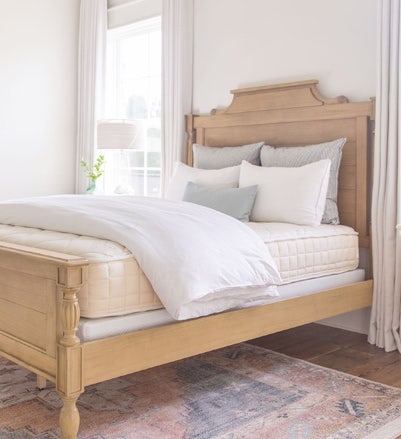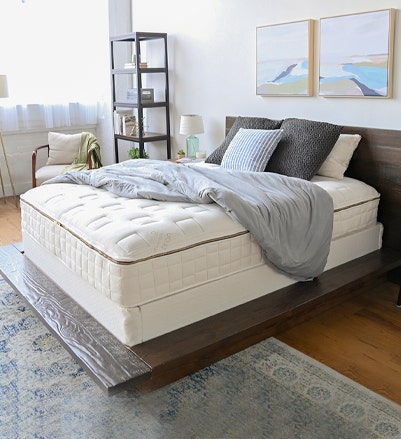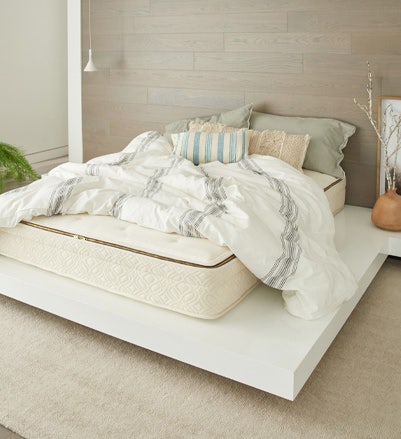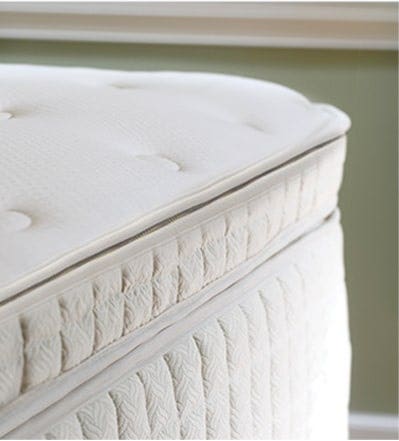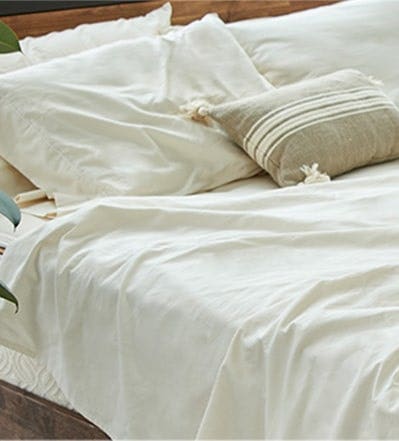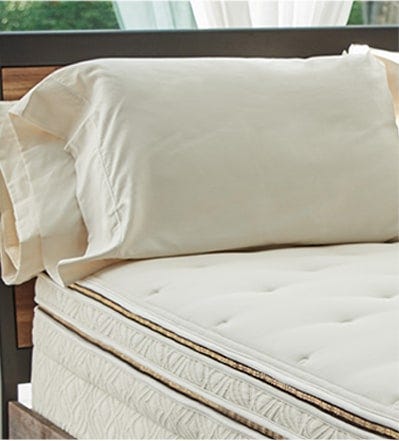There are two types of people in this world – those that sleep cold and those that sleep hot. If you’re someone who sleeps hot, then you know the struggle of tucking into your cozy bed and blankets only to be kicking them off hours later. So, what gives?
Many people “sleep hot” which leaves them tossing and turning all night and interferes with their quality of sleep. If you’re wondering, “Why do I get so hot when I sleep? And what can be done about it?”, keep reading to find out!
Reasons for Sleeping Hot
Sleeping hot can be attributed to several factors, both environmental and physiological. One common reason is the choice of bedding and sleepwear. Materials like polyester and memory foam can trap heat, while breathable fabrics like cotton and linen allow for better air circulation.
Physiologically, individual metabolism rates and hormonal changes can increase body temperature, as can health conditions such as:
- Hyperthyroidism
- Sleep apnea
- Anxiety
- Menopause
- Some medications
And even lifestyle factors like high levels of physical activity, alcohol usage or consuming hot and spicy foods close to bedtime can contribute to a warmer sleep experience as well because they amp up the body’s metabolic rate.
What's the Ideal Bedroom Temperature?


Room temperature also plays an obvious role in whether you sleep hot or not. Per the Sleep Foundation, the best room temperature for sleep is approximately 65° F.
As you prepare for sleep, your core body temperature naturally decreases, signaling to your brain that it's time to rest. A cooler bedroom environment aids this process by preventing overheating which, as mentioned, can disrupt sleep and reduce sleep quality.
Additionally, a cool room can enhance the production of melatonin, the hormone responsible for regulating sleep-wake cycles further promoting a restful night's sleep. When it comes to sleeping, a dark, cold, comfy, quiet environment is the goal.
First Things First: Your Mattress
If you’re a consistently hot sleeper, the first thing to take inventory of is your bedroom. Your mattress materials matter. Not only are memory foam options toxic and often laden with harmful chemical flame retardants, but they also retain heat. Lose, lose!
Latex is a great alternative if you want the pressure-point relieving qualities of memory foam without all the toxic chemicals and sweaty nights. Naturepedic’s mattresses are made with premium materials like GOTS-approved organic latex, plus breathable, GOTS certified organic cotton and moisture-wicking, GOTS certified organic wool – all great aids when it comes to temperature regulation.
Moreover, every Naturepedic mattress from Naturepedic is completely free of heat retaining memory foam – better for hot sleepers and, really, any sleeper.
Best Sheets for Hot Sleepers
Your bedding matters, too! When it comes to sheets, hot sleepers will benefit from light, breathable fabrics with moisture-wicking properties like flax linen and cotton percale. (The good news? Naturepedic offers certified organic bedding sets in both these materials!)
Made from soft, long-staple organic cotton, one of the most breathable natural fibers on Earth, our percale sheets are woven in a tight yet balanced weave. This classic one-over-one-under technique – and an optimal thread count of 300 – leaves plenty of room for air to flow between the yarns for super breathable, cool and comfy sleep.
Linen’s hollow fibers also allow for easy air and water circulation to provide exceptional moisture-wicking and breathability. This keeps you cool and dry in summer by drawing moisture from the body and quickly drying.
Hot sleepers can’t go wrong with either material (especially when both are GOTS certified organic, like ours!).
6 Cooling Tips for Hot Sleepers
For those who struggle with sleeping hot, consider these tips that go beyond bedding to enhance your comfort and improve your sleep quality.
Lightweight Sleepwear
When it comes to sleepwear, material and fit can make a significant difference in regulating your body temperature throughout the night. Opt for loose-fitting, lightweight sleepwear made from organic, natural fibers like cotton, wool or linen. These fabrics help keep your body temperature down by allowing air to circulate and moisture to evaporate, keeping you cooler and more comfortable as you sleep.
Maintain Airflow


Creating a cool sleeping environment involves more than just setting your thermostat between 60-67° F. Ensuring adequate airflow can further enhance your comfort. Consider running a fan or keeping a window slightly open (if the outdoor temperature is conducive) to promote air circulation. This helps prevent heat buildup and creates a refreshing breeze that can make a significant difference in your sleep quality.
Sleep for the Season
As seasons change, so should your approach to bedding and sleepwear. In the winter, thicker fabrics like wool can provide warmth, while in the summer, lighter fabrics such as linen are ideal for their breathability and moisture-wicking properties. By rotating your bedding and pajamas according to the season, you can better manage your body temperature and enjoy a more comfortable night's sleep year-round.
Sleep Alone
Sharing your bed with a partner, pet, or child can contribute to overheating due to the combined body heat. If you find yourself sleeping hot when sleeping with others, consider sleeping alone to reduce your exposure to additional body heat. This can significantly improve your sleep quality and help you maintain a cooler body temperature throughout the night.
Take a Warm Bath


Taking a warm bath before bed may seem counterintuitive, but it can actually help you cool down faster. The warm water initiates vasodilation, where blood vessels expand and increase blood flow to the skin, helping your body dissipate heat more effectively. This process aids in lowering your core body temperature, preparing you for a restful sleep. Additionally, the relaxation from a warm bath can help you unwind and ease into slumber.
Stay Hydrated
Hydration plays a crucial role in regulating body temperature. Keep a glass of ice water within reach on your nightstand to ensure you stay hydrated throughout the night. Sipping on cold water can provide immediate relief if you wake up feeling overheated, helping you cool down and get back to sleep more comfortably.
If you’re a hot sleeper, there’s hope for you still. By implementing these tips and tricks, you can reclaim your nights, wake up refreshed instead of sweaty and embrace the rejuvenating power of quality sleep.
 BABY
BABY  KIDS
KIDS  ADULT
ADULT  LEARN
LEARN  STORES
STORES 
